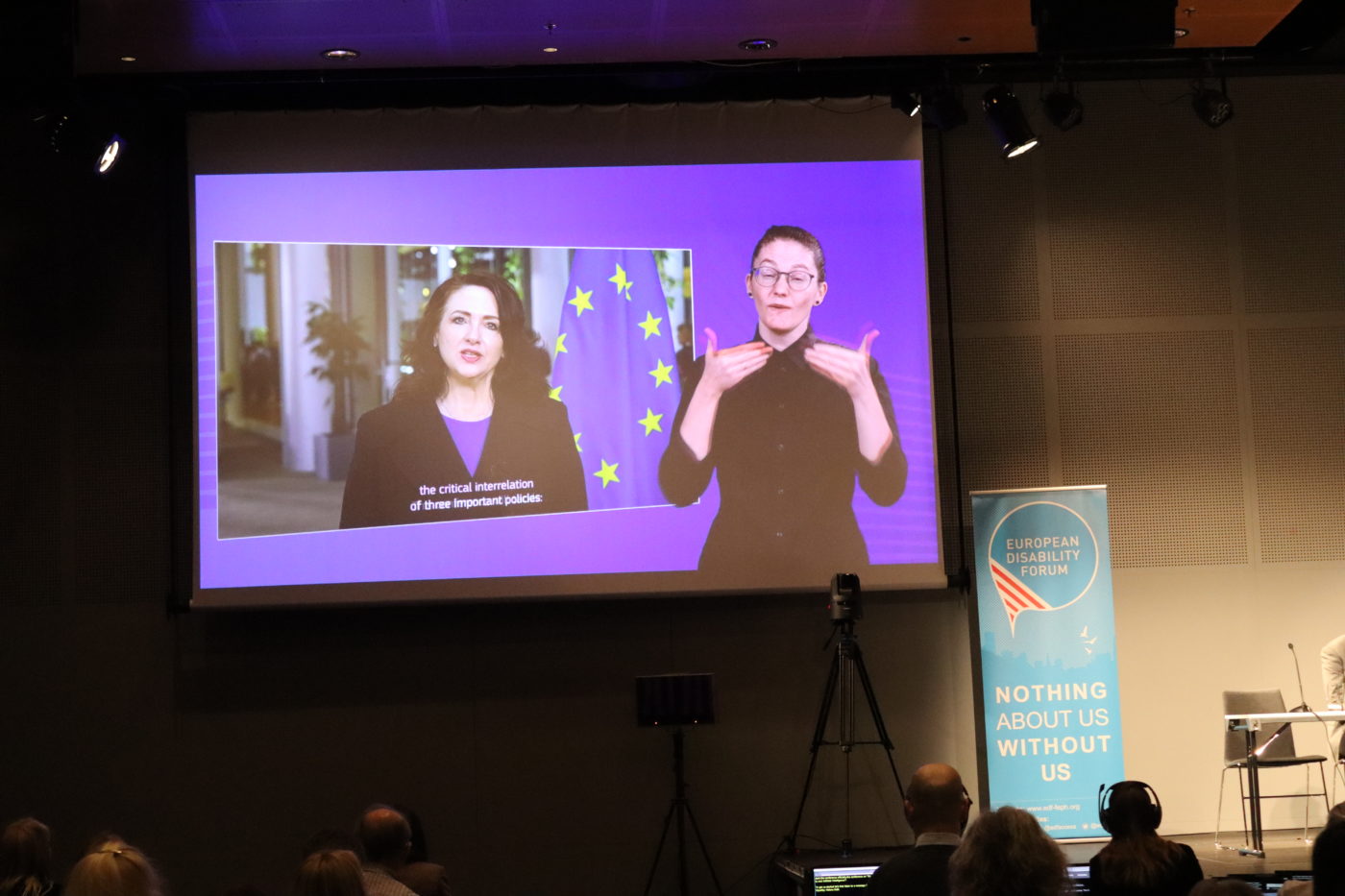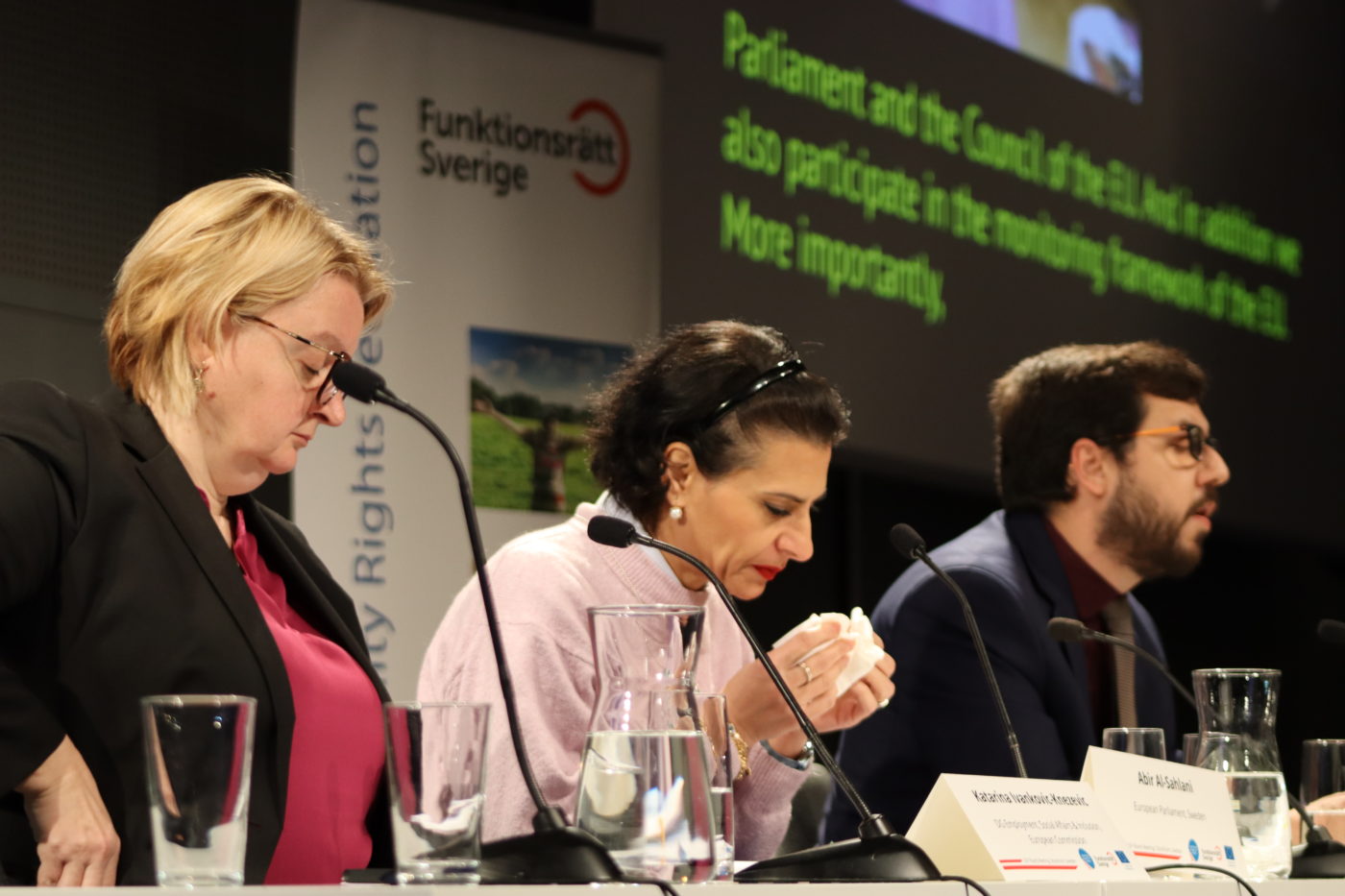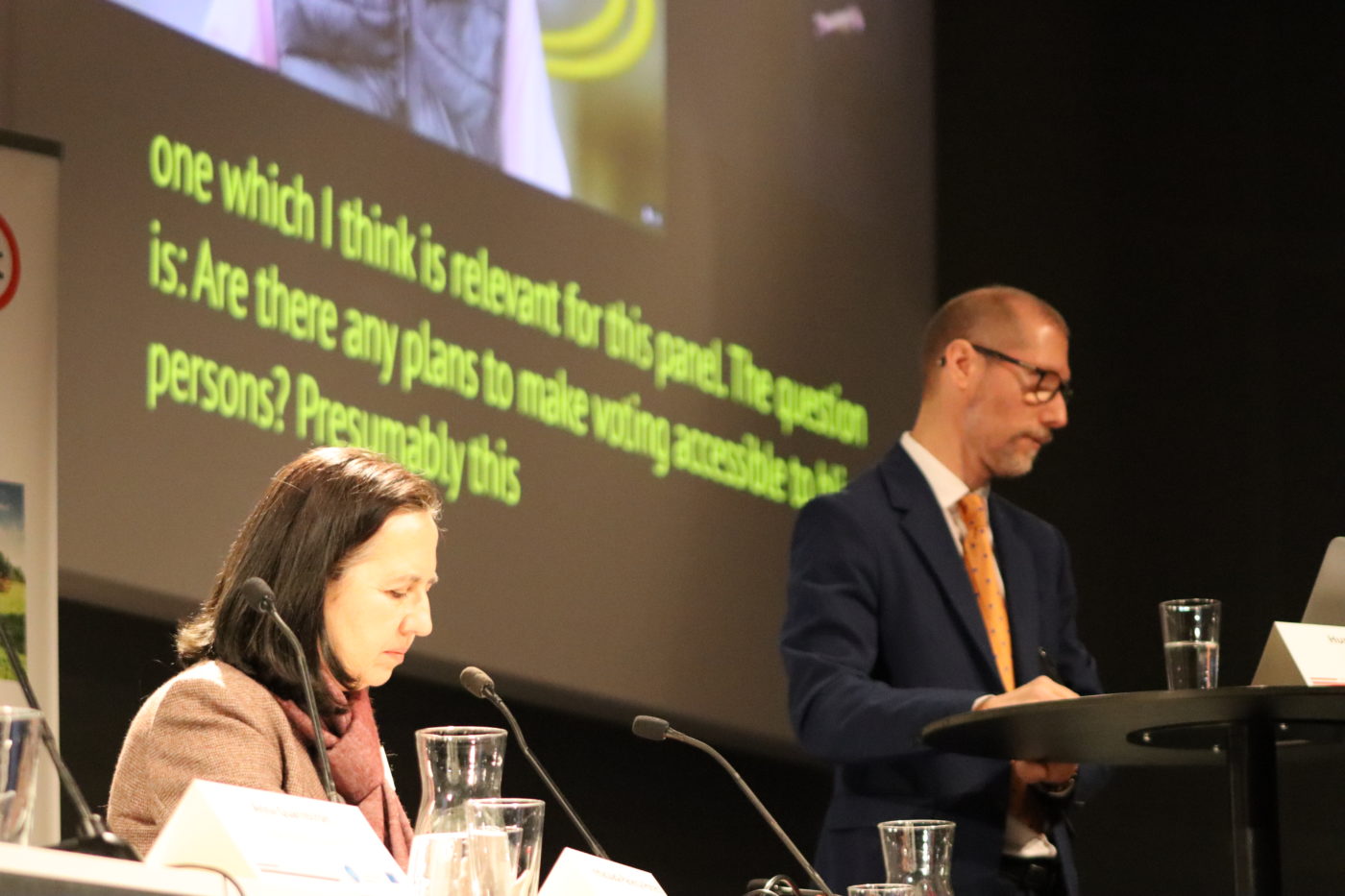This article provides a summary of the morning sessions of the Conference “Disability Rights, Accessibility and Artificial Intelligence”, dedicated to the future of disability rights and accessibility. For the afternoon sessions focused on Artificial Intelligence, read the article “Ensuring Artificial Intelligence systems respect disability rights”
On 31 March 2023, together with the Swedish Disability Rights Federation (Funktionsrätt Sverige), we hosted the conference “Disability Rights, Accessibility and Artificial Intelligence”.
The hybrid conference, co-funded by the Swedish Ministry of Health & Social Affairs and the Swedish Post & Telecom Authority, focused on three main topics:
- The future of Disability Rights in the EU and its Disability Rights Strategy;
- The implementation of the existing legislation and funding on accessibility – and how the AccessibleEU centre will help;
- the impact, opportunities and risks that recent developments in Artificial Intelligence systems will have on the rights of persons with disabilities.
The Conference started with keynote speeches from EU Commissioner for Equality Helena Dalli; Swedish Minister for Social Services Camilla Waltersson Grönvall; our Vice-president Pat Clarke; and the Director of the Swedish Disability Rights Federation, Nicklas Mårtensson.

During her video address, Commissioner Dalli highlighted the EU’s commitment to implement the UN Convention on the Rights of Persons with Disabilities, including in the context of digital transformation. She recognised digital transition as an opportunity to advance disability rights, especially through assistive technology, but also warned about the challenges created by this transformation: to overcome accessibility barriers and the digital divide, it is essential to invest in digital skills and make sure no one is left behind. She encouraged “concrete and affirmative actions (…) to avoid prejudice and stereotypes being reflected in AI technologies and robotics.”
Minister Waltersson Grönvall stressed the need to ensure full and equal participation of persons with disabilities in all aspects of life and prioritise the protection of persons with disabilities in situations of risk and humanitarian emergencies. She described Sweden’s work on disability rights during its Presidency of the EU Council, including hosting a conference on national strategies to promote the rights of persons with disabilities on 27 June.
The director of the Swedish Disability Rights Federation, Nicklas Mårtensson, invited participants to work together towards a more inclusive society, especially in response to the ongoing challenges caused by the pandemic, the Russian aggression to Ukraine, and the current cost of living crisis.
In the last keynote speech of the panel, our Vice-president, Pat Clarke, acknowledged the good progress made during the current legislative mandate of the EU, which is now coming to an end. He pointed out that the 2021-2030 Disability Strategy needs to be turned into reality to protect the right of persons with disabilities across Europe. He asked the audience to think about future initiatives and challenges, including mainstreaming disability rights in legislation such as the AI Act.
The Future of Disability Rights in the EU

During the first panel, speakers discussed the European Disability Rights Strategy and how disability rights can be strengthened.
The speakers included Member of the European Parliament Abir Al-Sahlani, UN Special Rapporteur Gerard Quinn, Katarina Ivankovic-Knezevic – Director for Social Affairs and Inclusion at the European Commission, and our Deputy Director Alejandro Moledo. Fredrik Malmberg, Director of the Swedish National Human Rights Institute, moderated the panel.
The panel concluded that:
- Disability rights must be considered in all political decisions. EU institutions must put in place mechanisms, structures and resources to effectively cooperate with the disability movement;
- Need to invest in and support representative organisations of persons with disabilities;
- The perspectives of persons with disabilities should also be considered in crisis responses – including response to the COVID-19 pandemic and the Russian aggression against Ukraine;
- The EU should stop EU Funds from supporting residential institutions, work towards recognising Sign Languages and implementing supported decision-making systems;
- The EU’s approach to mental health must be in line with the UN Convention onf the Rights of Persons with Disabilities.
UN Special Rapporteur Gerard Quinn also presented the report of his visit to the EU.
Creating an accessible EU for persons with disabilities
The second panel discussed how EU countries are implementing European accessibility legislation. The participants learned about the recently established AccessibleEU centre, managed by a consortium led by our member Fundación ONCE.
The panel, moderated by our Executive Committee member Humberto Insolera, was composed of Inmaculada Placencia Porrero, Senior Expert on Disability at the European Commission; Anna Quarnström, President of the association “Disability Rights Stockholm City”; and Jesús Hernández Galán, the accessibility director of Fundación ONCE.
The discussion brought more clarity to participants about the functioning of the AccessibleEU Centre. The Centre will bring experts, policymakers, users and other stakeholders such as academics, professionals working on the built environment, businesses, and others together to share knowledge on implementing legislation;
The AccessibleEU Centre is led by Fundación ONCE and includes the European Disability Forum, AGE Platform Europe, the European Network on Accessible Tourism and the European Association of Service providers for Persons with Disabilities. It includes 34 experts in 27 countries.
It has the following characteristics:
- It is a community of practice connecting over 500 professionals;
- Will develop a library with documents and good practice with the aim of collecting more than 60 practices per year;
- Will organise over 80 events each year at European and National levels to disseminate knowledge on accessibility and encourage networking and exchange among relevant stakeholders;
Additionally, panellists discussed the following:
- The need for national authorities to invest more budget and funds in the field of accessibility;
- The importance of joining and being included in national standardisation bodies; concerns were raised about national standard bodies not including persons with disabilities when asked.
- The importance of ensuring constructive dialogues on accessibility between organisations of persons with disabilities and municipalities on accessibility – and the facilitating role of the AccessibleEU centre in these.
- The Implementation of the EU Accessibility Act should improve the accessibility of services such as banking to persons with disabilities – including persons with psychosocial and intellectual disabilities. The provisions on interoperability with assistive devices are especially important.
Inmaculada Placencia Porrero also shared the guide “Buying Social”, which provides guidelines to Member States in Public Procurement processes.
These panels were followed by afternoon sessions on Artificial Intelligence. Read the article “Ensuring Artificial Intelligence systems respect disability rights”
